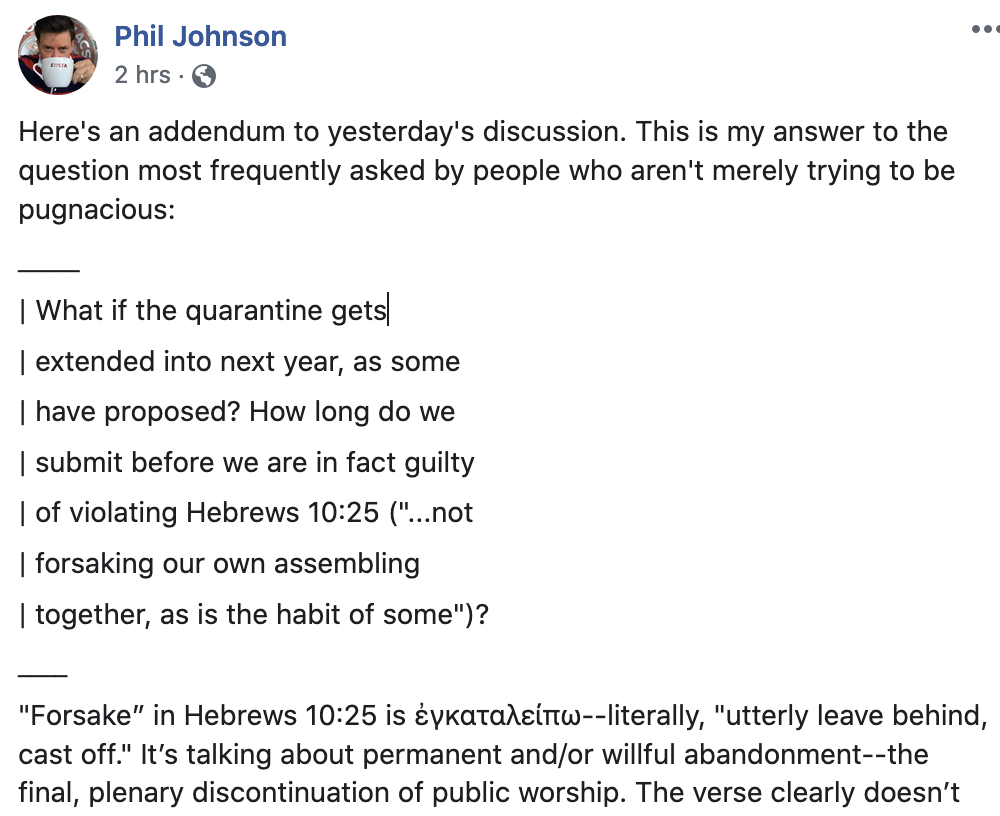Phil Johnson is feeling a bit testy in recent days, apparently feeling fatigued from having to damage-control the social media circus caused by Grace Community Church’s ping-ponging indecision on whether or not to open for services. And given their very public halting betwixt opinions, his annoyance is certainly understandable, albeit self-induced.
First, Grace Community Church (GCC) closed in order to obey [their shallow understanding of] Romans 13 in deference to California’s Governor Newsom. They assured themselves that the government was not picking on religious institutions and if it were, they would decide differently. After President Trump gave the all-clear for churches to meet nation-wide, GCC announced (in a now-deleted statement) that they would meet, and it was their elders’ assessment that California was picking on religious institutions. But then, the most liberal federal court in the nation, the 9th Circuit, opined that Trump had no such authority, so the church again backtracked and handed away the keys of the church to the judiciary. Curiously, GCC elders again argued that California was picking on religious institutions, but they backtracked from their initial claims that such would affect their decision-making.
I understand Phil being annoyed at the three-ring carnival and the crowd of spectators cheering them on one hand and jeering them on the other (or at least I presume it’s annoyance that lead him to refer to Christians able to exegete Romans 13 correctly as “Karens”). But again, the circus is their making…those clowns and elephants prancing around aren’t ours.
Lashing out at Christians capable of Scripture exposition and Scripture application regarding Romans 13, Phil made a lengthy post defending GCC’s actions in which he cherry-picked a short tweet confined to the prison of 280 characters and proceeded to write a book about Romans 13, 1 Peter 2, Acts 5:29, and Hebrews 10:25 unencumbered by character limits. All of it was built upon the dispensational premise that we have no 4th Commandment at all and therefore, the government was not instructing us to sin, ergo any claim of obeying Caesar over Christ was fallacious. I cannot help it if Phil defends GCC’s commitment to Lord’s Day antinomianism, and neither do I find it surprising. As for the content of that post, I will address it soon in a podcast and it suffices for now to point out that Phil ended with Luther’s famous words at the Imperial Diet of Worms, “Here I stand, I can do no other.”
My comment on the post should belittle it enough. The original post was a substantial self-mockery of its own content.

In this article, it’s Phil’s most recent addendum to his “Y’all are a bunch of Karens” that I feel the need to correct, mostly because it’s grossly inaccurate and twists the Bible.
Phil said on Facebook…

“Forsake” in Hebrews 10:25 is ἐγκαταλείπω–literally, “utterly leave behind, cast off.” It’s talking about permanent and/or willful abandonment–the final, plenary discontinuation of public worship.
Hebrews 10:25, for those who don’t know, says, “Not forsaking the assembling of ourselves together, as the manner of some is; but exhorting one another: and so much the more, as ye see the day approaching.”
Or for the learned among us, “μὴ ἐγκαταλείποντες τὴν ἐπισυναγωγὴν ἑαυτῶν καθὼς ἔθος τισίν ἀλλὰ παρακαλοῦντες καὶ τοσούτῳ μᾶλλον ὅσῳ βλέπετε ἐγγίζουσαν τὴν ἡμέραν.”
Phil’s argument is that ἐγκαταλείπω (technically ἐγκαταλείποντες) – or “forsake” – implies apostasy, not staying home from sacred Lord’s Day assemblies. I’ll first say that Phil’s textual argument here is 100% novel; I can find no commentary or scholarship to support his “point A” (the definition of “forsake”) leading to his “point B” (this verse doesn’t deal with the weekly assembly).
I can find evidence of a small, minority view among some that Hebrews 10:25 is not speaking of the weekly assembly, albeit this view is largely stricken from the major commentaries unless briefly mentioned and then rejected (as it is in Barnes’ Notes, who credits the view to Christian Gottlieb Kuhnol, an 18th Century German theologian). Most importantly to Phil Johnson, John MacArthur does not include this curious translation in his New Testament commentary of Hebrews 10:25, a fact I double-checked from my own copy of the volume personally signed by MacArthur himself. However, the minority view that Hebrews 10:25 is speaking to rank apostasy and not Lord’s Day abandonment is not tied anywhere or by anyone except Phil Johnson (that I can find) to the translation of ἐγκαταλείποντες. Rather, Kuhnol ties this belief to the translation of ἐπισυναγωγὴν “assembling,” claiming that this speaks of the Christian church as a whole and not the meetings of the church.
This belief, that Hebrews 10:25 does not speak of rank apostasy but of forsaking Lord’s Day assemblies is reinforced – as Jamieson-Faussett-Brown Commentary points out – because “This gentle expression [ἔθος τισίν, or “the habit of some”] “proves he is not here as yet speaking of apostasy.” Simply put, the language used by the Apostle towards the “some” refer to erring compatriots, not apostates (see below).

Virtually every commentary that would grace the shelves of the typical pastor would contradict Phil’s view on this point and reiterate that Hebrews 10:25 is speaking of forsaking regular attendance in the weekly assemblies.
But if the usual commentaries speaking contradiction to Phil don’t give him pause, perhaps the Prince of Preachers might offer some correction.
Spurgeon preached several sermons from Hebrews 10:25, almost all of which iterate that the verse applies to forsaking the regular, weekly assemblies of the church.
In his comments on Hebrews 10:25, not only does Spurgeon claim this verse deals with the weekly assembly, he rebukes those who stay home only to read sermons from the printing press.
Spurgeon writes…
“Yes; there are some who even make a bad use of what ought to be a great blessing, namely, the printing-press, and the printed sermon, by staying at home to read a sermon because, they say, it is better than going out to hear one. Well, dear friend, if I could not hear profitably, I would still make one of the assembly gathered together for the worship of God. It is a bad example for a professing Christian to absent himself from the assembly of the friends of Christ.
He continues, “There was a dear sister, whom many of you knew, who used to attend here with great regularity, although she could not hear a word that was said; but she said it did her good to join in the hymns, and to know that she was worshipping God with the rest of his people. I wish that some, who stay away for the most frivolous excuses, would think of this verse: “Not forsaking the assembling of ourselves together, as the manner of some is.”
Phil would apparently tell Spurgeon that he has the verse all wrong, and it doesn’t count as “forsaking” unless that ‘dear sister’ apostatized the faith and left Christianity altogether. Spurgeon would rebuke him back for telling people to stay home and watch sermons on the Internet.
The Lesson Learned
Theology should not be done for convenience. Novel interpretations of words should not be done to settle an argument, especially when it is a poor one.
I would be content if John MacArthur and Phil Johnson would put half as much effort into expositing Romans 13 as they characteristically do the rest of Scripture. For those of us paying attention, it’s apparent that they have settled for a very easy, minimalistic reading of the Text that leads to reed-blowing and fence-sitting.
Even if they will not change their view, I would be far happier if the good brothers at Grace Community Church would admit that they struggle with the decision to “civilly disobey” because they are products of a certain Southern California Statism. It is not Scripture that leads them to ping-pong their decision to open their church, but is more than likely a Californication of their theology.
Truth be told, they are reading their own culture into Scripture far more than anyone who applies Romans 13 to the American form of government.
[Publisher’s Note: Contributed by JD Hall, and for the record, I have little doubt that MacArthur and Johnson are woeful regarding their church closure and agonize over it. Nonetheless, ultimately it is their decision, and not Governor Newsom’s, to remain closed]











